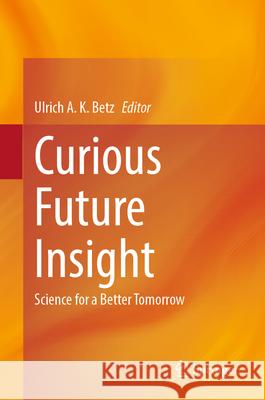Curious Future Insight: Science for a Better Tomorrow » książka



Curious Future Insight: Science for a Better Tomorrow
ISBN-13: 9783031417801 / Angielski
Curious Future Insight: Science for a Better Tomorrow
ISBN-13: 9783031417801 / Angielski
(netto: 613,40 VAT: 5%)
Najniższa cena z 30 dni: 616,85
ok. 16-18 dni roboczych.
Darmowa dostawa!
From a 350th anniversary to a global movement – united by science for a better tomorrow.- Advancing Human Progress as a 21st-Century Science and Technology Pioneer.- Bringing photosynthesis 2.0 to life.- Medical implications of functional and destructive cellular motions: curiosity driven open issues.- Cellular responses to DNA damage: translating mechanistic insights towards new therapies.- From Waste to Food: Towards the Creation of a sustainable Food Generator.- Did you know?.- Chemistry – From Matter to LIfe.- Providing the Means of Action.- Recent Breakthrough Technologies.- Contribution from Hessen Digital Minister Professor Kristina Sinemus for Curious 2022.- Space the final frontier.- Still Curious: When Science meets the Public.- The World in 2050 and Beyond.- Climate-responsible finance: A moral imperative toward children.- Fridays for Future breaking social systems with non-violent civil disobedience.- The Keeling Curve Prize: How a Climate Action Prize Gets It Done.- Challenging The Scientific Ethic in the Age of Biotechnology.
Dr. Ulrich A.K. Betz, Vice President of Innovation at Merck, is responsible for innovation management and strategic academic collaborations. He is an accomplished R&D manager with more than 20 years of experience in the pharmaceutical and chemical industry, including positions in the President’s Office at Merck Biopharma, and positions reporting directly to the Heads of Research and Development at Bayer and Merck. In his current role, for example, he designed and implemented the Merck Innovation Cup, the Curious2018 – Future Insight Conference, the Merck Future Insight Prize, the Darmstadt Science Declaration, the idea competition innospire and the BioMed X Outcubator.
Prior to joining Merck in 2005, he worked at Bayer AG for seven years, in various scientific and managerial positions in Pharma Research. Ulrich received his PhD in functional genomics and immunology from the University of Cologne, Germany, and his diploma in biochemistry and physiological chemistry from the University of Tübingen, Germany. He is a co-inventor of the marketed anti-viral drug Letermovir (Prevymis) and of Pritelivir (Phase II). Ulrich has won several innovation awards such as the German Industry Innovation Award (the world’s oldest innovation award), two International Business Awards (Stevie Gold Awards Executive of the Year – Pharmaceuticals and Innovator of the Year), a Stevie Gold Germany Award (R&D Manager of the Year Germany), Edison Award, the Bio IT World Best Practice Award, and the German Idea Award. Ulrich is the author or co-author of over 90 publications (e.g. in Cell, Nature Medicine, and Nature Biotechnology).This book follows up the debate on the future of science and technology at the Curious2022 – Future Insight Conference, the second event in this conference series initiated on the occasion of Merck’s 350th anniversary. In the respective chapters, some of the world’s top scientists, managers and entrepreneurs explore breakthrough technologies and how they can be applied to make a better world for humanity.
The book begins with an introduction to the vision of the conference “United by science for a better tomorrow” and the impacts caused by the pandemic, highlighting the importance of gathering like-minded people to discuss and support the advancement of science and technology for the benefit of humanity. In the first part of the book, readers will also find a chapter written by the Executive Board of Merck KGaA discussing the importance of curiosity for innovation and an overview of the company’s contribution in the areas of life sciences, healthcare and electronics forward-moving the scientific discovery. The second part of the book offers insights of some of the scientific topics discussed at the conference, and particular attention is given to new therapies and sustainability. In the final part of the book, readers will find some thoughts on ethical principles guiding our application of science and technology to create a bright future for humanity, and diverse perspectives on topics such as health, life sciences, nutrition, material sciences, digitalization, AI, energy, mobility, space flight, robotics, the secrets of the human mind and new ways of working together.Given its interdisciplinary appeal, the book will inspire curiosity in a wide readership, from scholars and researchers to professionals with an interest in exploring the future of science and technology, solving the problems of today, and paving the way for a better tomorrow.
Chapters 1 and 2 are available open access under a Creative Commons Attribution 4.0 International License via link.springer.com
1997-2026 DolnySlask.com Agencja Internetowa
KrainaKsiazek.PL - Księgarnia Internetowa









